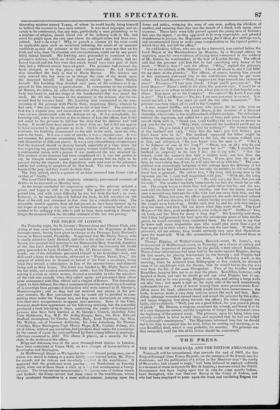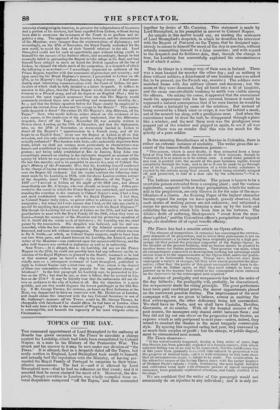THE PRESS.
THE HOUSE OF BRAGANZA AND THE BRITISH AMBASSADOR.
TIMES—It will be remembered, that towards the end of 1807, the late King of Portugal (then Prince Regent), on the entrance of the French into his dominions, and the publication of a notice in the Moniteur that" the family of BRAGANZA had ceased to reign," had been induced to embark suddenly in a moment of alarm and panic for Rio de Janeiro, a measure which the British Government had been urging upon him in vain for some months before. Lord Strangford, who was then our Envoy at the Court of Lisbon, and who had been employed to press upon, the weak and vacillating Regent the necessity of emigrating to America, to preserve the independence of his crown and a portion of his territory, had been expelled from Lisbon, without having Leen able to overcome the resistance of the Court to so perilous and repulsive a step. The approach of the invader, however, and the denunciation of the Moniteur, were stronger than the representations of diplomacy ; and accordingly, on the 27th of November, the Royal Family embarked for the new world, to avoid the fate of their Spanish relatives in the old. Lord Strangford could not let such an opportunity pass without taking credit to himself for the success of his fruitless efforts, and accordingly, though he had avowedly failed in persuading the Regent to take refuge in his fleet, and had himself been obliged to move on board the British squakon off the bar of Lisbon, he claimed the whole merit of the emigration, in a despatch of which the following is an extract:—" I accordingly requested an audience of the Prince Regent, together with due assurances of protection and Security; and upon receiving his Royal Highness's answer, I proceeded to Lisbon on the '27th, in his Majesty's ship Conjiance, bearing a flag of truce. I had inanedaddy most interesting communications with the Court of Lisbon, the particulars of which shall be fully detailed in a future despatch. It suffices to mention in this place, that the Prince Regent wisely directed all his apprehensions to a French army, and all his hopes to an English Fleet ; that he received the most explicit assurances from me, that His Majesty would generously overlook those acts of unwilling and momentary hostility, 82c., &c.; and that the British squadron before the Tagus should be employed.to protect his retreat from Lisbon and his voyage to the Brazils." This memorable despatch is dated "November 29, His Majesty's ship Hibernia, off the Tagus." Now, who would believe, unless almost on the evidence of his own senses, or the confession of the party implicated, that this Hibernian despatch, dated off the Tagus, November 29, was actually written in Bruton street, London, pri the 111th of December, and that the diplomatist, who, on the 27th of November, so dexterously landed in Lisbon to direct all the Regent's " apprehensions to a French army, and all his hopes to an English fleet," never saw the Regent at Lisbon at all on that occasion, and was only admitted to an audience after his Royal Highness had actually embarked ? This freedom with facts—this undeniable departure from truth, which we shall not venture more particularly to characterize—was known and established by irresistible evidence soon after the Brazilian emigration; and being safely established at Rio de Janeiro, King John was exceedingly amused on reading in the diplomatic despatch an account of the agency by which he was persuaded to leave Europe; but it was only within the last two months, and in his pamphlet in answer to a note of Colonel Napier's History of the Peninsular War, that his Lordship himself confessed to the charge of having written his despatch in England, and of never having seen the Regent till on-board. Let the reader confront the following statement made by his Lordship in 1828, with the above London-written extract of the despatch, dated " His Majesty's ship Hibernia, off the Tagus," in 1807 :—" I arrived at Lisbon on the night of the 28th inst., and almost immediately saw Mr. A'Aranjo, who was already on board ship. I then proceeded to the vessel in which the Prince Regent was embarked, and notwithstanding the assertion to the contrary in Colonel Napier's note, I had a long and most confidential interview with his Royal Highness. I hail then, as Colonel Napier truly states, no power either to advance or to retard the emigration ; but when did I ever assume that I had, or did take any credit to myself for anything that passed at that interview with his Royal Highness ?" But though his Lordship did not land at Lisbon on the 27th, and had not the good fortune to meet with the Royal Family till the 28th, when they were on board—though the menaces of the Moniteur and the protecting squadron of Sir S. Smith did the whole work of diplomacy ; his Lordship was the chief gainer by the transaction. His despatch was believed, and his zeal was rewarded, while the less obtrusive merits of the Admiral remained unemblazoned, and were left without recompense. The red riband which was due to Sir S. Smith—or which, as Colonel Napier suggests, ought to have been cut into three parts, and shared between his Lordship, the Admiral, and the writer of the Moniteur—was conferred upon the unsuccessful Envoy, and the alter tulit honorer was verified in diplomacy as well as in authorship. NEW TIMES.-It is alleged, that as his Lordship did not see the Prince Regent on the 27th, he could not possibly have had any influence on the resolution of his Royal Highness to proceed to the Brazils, inasmuch as he had at that moment gone on board a ship in the river. And this allegation chiefly rests on a subsequent statement of Lord Strangford, published in reply to Colonel Napier only a short time ago. Now, where is the discord of these two statements—where the grounds for the impudent charge of falsehood ? In the first paragraph his Lordship says, he proceeded to Lisbon on the 27th; but does he say, or does it follow, that he arrived at Lisbon on the 27 MP It may be literally true that the ambassador did not obtain an audience in the city of Lisbon at all. But the objection is a mere quibble, and one that would disgrace the lowest pettifogger at the Old Bailey. If Mr. George Tierney, for instance, on board an East Indiaman at the Nore, was despatched to have an interview with Mr. Huskisson at London, arid should obtain this intervielv with the late Colonial Secretary in one of Mr. Galloway's steamers off the Tower, would he, Mr. George Tierney, be chargeable with falsehood if he should affirm he had been at London when he had only been a little to the westward of Wapping ? The thing is absurd, is contemptible, and beneath the ingenuity of the most vvhipster critic in Christendom. •



















 Previous page
Previous page